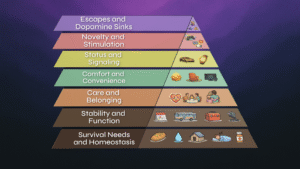
#112 | Frankly
The Quadruple Bifurcation
Description
In this week’s Frankly, Nate outlines four bifurcations that are likely to underpin the human experience in the near future. While the broad biophysical realities of energy and ecology underpin our civilization’s movement over time, in the moment, people will experience these trends mostly economically and psychologically. Whether related to the widening of an already existing economic gap or the expansion of dependence on cognitive crutches like AI, the demographics that comprise society are starting to splinter – to bifurcate. These divergences, and the ways we cope with them, contribute to increasing incoherence as a species.
What are the areas we might witness societal bifurcation? Why should we strive to meet others in the context of their lived experiences, even when they diverge radically from our own? How might progress itself start to be redefined?
In French, we have a motto that says that a simple drawing is often better than a long explanation. Jean-Marc Jancovici Carbone 4 President
That’s very understandable because with left atmosphere thinking, one of the problems is that you see everything as a series of problems that must have solutions. Iain McGilchrist Neuroscientist and Philosopher
We can’t have hundreds and hundreds of real relationships that are healthy because that requires time and effort and full attention and awareness of being in real relationship and conversation with the other human. Nate Hagens Director of ISEOF
This is the crux of the whole problem. Individual parts of nature are more valuable than the biocomplexity of nature. Thomas Crowther Founder Restor
Show Notes & Links to Learn More
Download transcriptThe TGS team puts together these brief references and show notes for the learning and convenience of our listeners. However, most of the points made in episodes hold more nuance than one link can address, and we encourage you to dig deeper into any of these topics and come to your own informed conclusions.
01:03 – Joseph Tainter, Peter Turchin, and Luke Kemp on TGS
01:27 – Bifurcation
02:20 – Frankly #108 The Influence of Psychopaths: Why Humans Are Better Than We Think
02:40 – How asset inflation benefits the top quintile, Bankrate wage to inflation index
02:50 – Americans living paycheck-to-paycheck, high employment rates, stock market highs
03:02 – Americans on SNAP, Ongoing government shutdown threatens SNAP benefits
04:02 – Hourglass economy
04:58 – Universal basic income
05:37 – IEA Energy and AI report (contains outlooks for AI growth)
05:58 – Average American energy consumption
06:54 – Use of oil added equivalent of 500 billion human workers to the economy
07:08 – Global economy is 1,000x bigger than 500 years ago,
07:17 – average human consumes 10-30x more in goods and services than we did in year 1800
07:41 – About 1% of Americans are leading AI and technology
09:15 – AI giveaways (“it’s not X, it’s Y”)
09:34 – Nora Bateson, Zak Stein
09:50 – Jeremy DeSilva, et al. – Human brains have shrunk: the questions are when and why
10:13 – GPS use and navigation ability, de-skilling phenomenon
11:28 – Half of Americans use AI large language models
13:05 – ~60 million Americans had some mental illness in 2022
13:35 – Anandi Mani, et al. – Poverty Impedes Cognitive Function
14:13 – Catherine K. Ettman, et al. – Financial assets and mental health over time
14:53 – Almost 50 percent of people who make over six figures live paycheck to paycheck
16:40 – Frankly #65 – And Then What?: Using Wide-Boundary Lenses (islands of coherence)
17:21 – Library of Healing, Frankly #88 – Snow, The Singularity, and Rocks in the River
18:45 – John Cairns Jr. – The Human Economy is a Subset of the Biosphere
19:47 – Rube Goldberg machine







